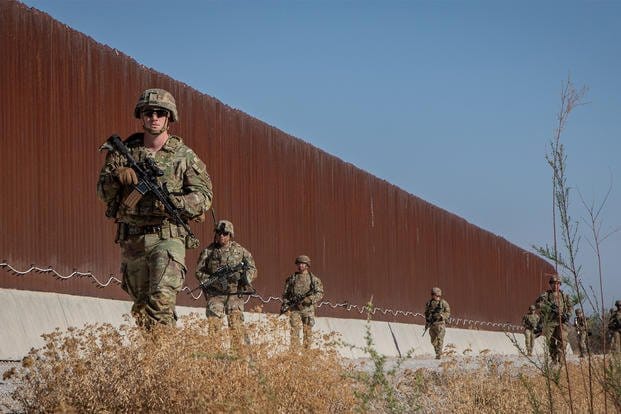U.S. Considers Military Deployment for Migrant Detentions at the Border: Legal, Strategic, and Humanitarian Implications

Introduction
In a dramatic escalation of federal border enforcement, the Trump administration has initiated steps to place a federal buffer zone along the U.S.-Mexico border—known as the Roosevelt Reservation—under direct military jurisdiction. This move, formalized in a presidential memorandum, would allow the U.S. Army to detain migrants for trespassing on what would be classified as military property, circumventing longstanding federal laws that prohibit the military from engaging in civilian law enforcement on American soil[1][2][3][4][5][6][7][8]. The Pentagon is currently piloting this approach in New Mexico, with plans to expand if deemed effective. The policy marks the broadest use of active-duty troops at the southern border in modern history and is already sparking intense legal, political, and humanitarian debate.
Background: The Roosevelt Reservation and Trump’s Directive
What is the Roosevelt Reservation?
The Roosevelt Reservation is a 60-foot-wide strip of federally owned land that runs along much of the U.S.-Mexico border in California, Arizona, and New Mexico, excluding tribal and private lands. Established by President Theodore Roosevelt in 1907, its original purpose was to prevent smuggling and maintain border security[1:1][5:1].
Trump’s Memorandum
On April 12, 2025, President Trump signed a memorandum transferring jurisdiction of the Roosevelt Reservation from the Department of the Interior to the Department of Defense[1:2][2:1][3:1][4:1][5:2][6:1][7:1][8:1]. The order designates the area as a “military installation” or “National Defense Area,” authorizing the Army to:
- Erect additional fencing and signage warning against trespassing.
- Detain any unauthorized individuals, including migrants, found on the property.
- Hand over apprehended migrants to local law enforcement or Border Patrol.
The initial pilot will last 45 days in a section of New Mexico east of Fort Huachuca, Arizona, with the possibility of expansion[2:2][3:2][7:2].
Legal and Constitutional Issues
The Posse Comitatus Act
The Posse Comitatus Act (1878) prohibits the use of the U.S. military for domestic law enforcement except in rare circumstances. Historically, military personnel at the border have been limited to support roles—providing surveillance, logistics, and construction—while law enforcement duties remained with Customs and Border Protection (CBP) and Immigration and Customs Enforcement (ICE)[1:3][3:3][9][10].
Circumventing Posse Comitatus
The administration’s strategy is to classify the Roosevelt Reservation as a military base, arguing that military police can enforce security on military property[2:3][3:4][4:2][5:3][6:2][7:3][8:2]. However, legal experts are skeptical:
“They are setting out to arrest and detain migrants by building this installation, and that is not consistent with Posse Comitatus. It just isn’t,” said Elizabeth Goitein, senior director at the Brennan Center’s Liberty and National Security Program[1:4][2:4][3:5].
The so-called “military purpose doctrine” allows for some law enforcement if it is incidental to a military mission, but experts argue that the primary intent here is border enforcement, not military necessity[3:6][8:3].
Anticipated Legal Challenges
Civil liberties groups, members of Congress, and legal scholars have already signaled that the move will face immediate court challenges[4:3][6:3][8:4]. Rep. Ro Khanna (D-CA) stated, “It’s a longstanding law that you can’t use the military for domestic enforcement. It’s a violation of the Constitution. I’m hopeful the Supreme Court would, 9-0, rule that way”[4:4][6:4].
Operational Details and Military Involvement
How Will the Military Operate?
- Patrols and Detentions: Troops will patrol the Roosevelt Reservation, using military vehicles and equipment, including Stryker armored vehicles, to detect and intercept unauthorized crossings[1:5][3:7].
- Detention Protocol: Migrants apprehended by military personnel will be detained for trespassing on military property and then handed over to civilian law enforcement or Border Patrol[2:5][3:8][7:4][8:5].
- Infrastructure: The Army will erect new fencing and multilingual signage warning of military jurisdiction and the consequences of trespassing[2:6][3:9][8:6].
Scale and Expansion
- The pilot program covers a segment in New Mexico but could be extended to the entire Roosevelt Reservation, which spans hundreds of miles across three states[2:7][3:10][5:4][6:5][7:5].
- Homeland Security Secretary Kristi Noem stated, “We’ll keep them there until that border is completely secure, and we see all-time record lows of encounters”[4:5][6:6].
Strategic and Political Context
Motivations
President Trump has made border security and mass deportations central themes of his administration and 2024 campaign[5:5]. The move to militarize the border is framed as a response to what the administration calls an “invasion” and a need for “the best border we’ve had, ever”[4:6][5:6][6:7].
Precedent and Escalation
While the military has supported border operations since the 1990s, their role has been strictly limited to support functions[9:1][10:1]. This directive marks a significant escalation, with active-duty troops now authorized to detain civilians—a first in modern U.S. history[1:6][2:8][3:11][4:7][5:7][6:8][7:6][8:7].
Humanitarian and Practical Concerns
Impact on Migrants and Asylum Seekers
- Deterrence and Fear: The presence of armed troops and the threat of military detention may deter not only unauthorized crossings but also legitimate asylum seekers, raising concerns about violations of international law and U.S. treaty obligations[9:2][10:2].
- Conditions and Oversight: Human rights organizations warn that military-run detention could lead to abuses, lack of due process, and inadequate humanitarian standards[9:3][10:3][11].
- Outdoor Detention Sites: There are already reports of outdoor detention sites along the border, where migrants are held in harsh conditions without adequate shelter, food, or medical care[11:1].
Community and Cross-Border Relations
- Local Impact: Border communities may experience increased tension, with concerns about the militarization of civilian areas and the potential for confrontations or accidental harm.
- International Relations: The move could strain relations with Mexico and other neighboring countries, complicating cross-border cooperation on security and migration.
Political and Public Reactions
Supporters’ Arguments
- National Security: Proponents argue that the measure is necessary to secure the border, deter illegal crossings, and combat drug trafficking and smuggling[4:8][5:8][6:9].
- Executive Authority: The administration maintains that the president has broad powers to defend national security and control federal property.
Critics’ Arguments
- Legal Overreach: Critics see the move as a clear violation of the Posse Comitatus Act and the Constitution[1:7][2:9][3:12][4:9][6:10][8:8].
- Militarization of Civil Society: There is widespread concern about the precedent set by using the military for domestic law enforcement, with fears of eroding civil liberties and democratic norms[1:8][2:10][3:13][4:10][6:11][8:9].
- Humanitarian Risks: Advocacy groups warn of increased risks to vulnerable migrants and the potential for human rights abuses[9:4][10:4][11:2].
Next Steps and Unresolved Questions
Legal Review and Court Challenges
The Pentagon is still reviewing the legality of the directive, and lawsuits are expected to be filed as soon as the first detentions occur[2:11][3:14][4:11][6:12][8:10]. Key questions include:
- Can the administration legally redefine a border strip as a military installation for the purpose of circumventing Posse Comitatus?
- What limits, if any, will courts place on the military’s authority to detain civilians on U.S. soil?
Implementation and Oversight
- How will the military coordinate with CBP and local law enforcement?
- What standards will be in place for the treatment and transfer of detainees?
- How will the administration ensure transparency and accountability in military-run border operations?
Conclusion
The Trump administration’s move to place the Roosevelt Reservation under military jurisdiction and authorize the detention of migrants by active-duty troops represents a watershed moment in U.S. border policy. While supporters frame it as a necessary step to secure the border, critics warn of grave legal, constitutional, and humanitarian risks. As the Pentagon pilots the new approach and legal challenges loom, the nation faces a fundamental debate over the role of the military in civil society and the balance between security and civil liberties at America’s southern border[1:9][2:12][3:15][4:12][5:9][6:13][7:7][8:11].
https://www.military.com/daily-news/2025/04/14/military-take-over-federal-land-along-border-under-new-trump-order.html ↩︎ ↩︎ ↩︎ ↩︎ ↩︎ ↩︎ ↩︎ ↩︎ ↩︎ ↩︎
https://apnews.com/article/border-trump-roosevelt-military-immigration-85974188a51593351eed70ad26291888 ↩︎ ↩︎ ↩︎ ↩︎ ↩︎ ↩︎ ↩︎ ↩︎ ↩︎ ↩︎ ↩︎ ↩︎ ↩︎
https://www.armytimes.com/news/your-army/2025/04/14/us-army-to-control-federal-land-along-us-mexico-border/ ↩︎ ↩︎ ↩︎ ↩︎ ↩︎ ↩︎ ↩︎ ↩︎ ↩︎ ↩︎ ↩︎ ↩︎ ↩︎ ↩︎ ↩︎ ↩︎
https://cbsaustin.com/news/nation-world/trump-authorizes-military-control-over-border-land-sparking-legal-debate-roosevelt-reservation-california-arizona-new-mexico-kristi-noem-ice-arrests-deportation ↩︎ ↩︎ ↩︎ ↩︎ ↩︎ ↩︎ ↩︎ ↩︎ ↩︎ ↩︎ ↩︎ ↩︎ ↩︎
https://www.foxnews.com/politics/trump-orders-military-control-federal-lands-southern-border ↩︎ ↩︎ ↩︎ ↩︎ ↩︎ ↩︎ ↩︎ ↩︎ ↩︎ ↩︎
https://abc3340.com/news/nation-world/trump-authorizes-military-control-over-border-land-sparking-legal-debate-roosevelt-reservation-california-arizona-new-mexico-kristi-noem-ice-arrests-deportation ↩︎ ↩︎ ↩︎ ↩︎ ↩︎ ↩︎ ↩︎ ↩︎ ↩︎ ↩︎ ↩︎ ↩︎ ↩︎ ↩︎
https://www.opb.org/article/2025/04/14/us-army-to-control-land-on-mexico-border-as-part-of-base-migrants-could-be-detained-officials-say/ ↩︎ ↩︎ ↩︎ ↩︎ ↩︎ ↩︎ ↩︎ ↩︎
https://www.nytimes.com/2025/04/11/us/politics/trump-military-border.html ↩︎ ↩︎ ↩︎ ↩︎ ↩︎ ↩︎ ↩︎ ↩︎ ↩︎ ↩︎ ↩︎ ↩︎
https://www.wola.org/2025/04/weekly-u-s-mexico-border-update-el-salvador-renditions-budget-military-role-march-migration/ ↩︎ ↩︎ ↩︎ ↩︎ ↩︎
https://www.jeelani-law.com/us-military-deployed-to-mexico-border/ ↩︎ ↩︎ ↩︎ ↩︎ ↩︎
https://www.wola.org/2025/04/weekly-u-s-mexico-border-update-supreme-court-el-salvador-renditions-mass-deportation/ ↩︎ ↩︎ ↩︎




